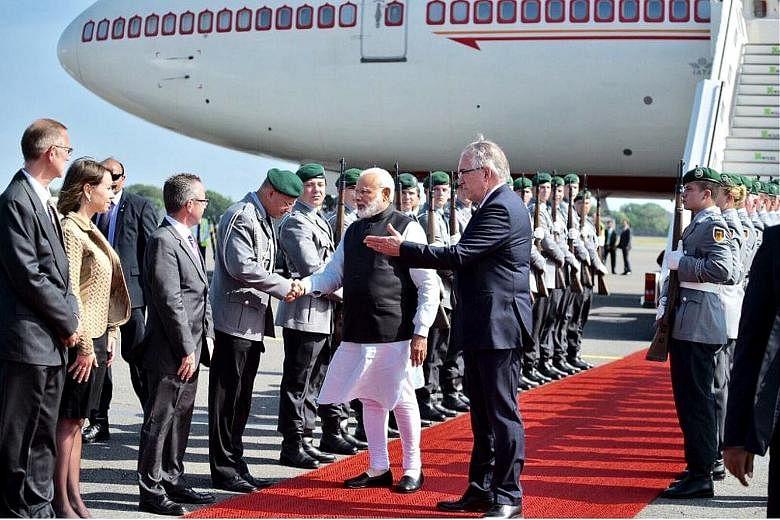BERLIN • India is keen to attract more German companies to invest and improve bilateral relations, Indian Prime Minister Narendra Modi said ahead of a two-day visit to Europe's leading economic power.
Mr Modi's four-nation tour of Europe also includes stops in France and Spain, and a face-to-face with President Vladimir Putin in Russia.
Mr Modi's arrival yesterday came a day after German Chancellor Angela Merkel shocked many in Washington and London by saying Europe must take its fate into its own hands, implying that the United States under President Donald Trump and Britain after its Brexit vote were no longer reliable partners.
Chinese Premier Li Keqiang also visits Berlin this week, and the arrival of two leaders of rising Asian powers in the wake of Dr Merkel's speech has prompted talk of an eastern pivot in previously firmly Atlanticist Germany.
"Both (the German and Indian) governments are firmly committed to strengthening economic relations," Mr Modi said in an interview with Handelsblatt newspaper.
"I am very optimistic about our future partnership."
Dr Merkel's remarks, made to her Christian Democrat party's Bavarian allies in Munich, were all the more striking since Dr Merkel, a fan of the US as a teenager in communist East Germany, has always been known as a convinced Atlanticist.
"The times when we could fully rely on others are somewhat in the past," she said in a Munich beer tent to lasting applause from her Christian Social Union allies, making palpable her disappointment at failing to secure Mr Trump's backing for the Paris climate accord at the weekend G-7 summit.
"We Europeans must really take our fate into our own hands,"she said.
"Of course in friendship with the United States of America, of course in friendship with Great Britain."
In China and India, Dr Merkel saw the possibility of a partnership in favour of action to slow climate change and to promote free trade, noted Handelsblatt, the newspaper of Germany's business elite.
"After the disappointing G-7 summit, the German chancellor is turning her hopes for free trade and climate protection to India and China," the paper wrote on its front page yesterday.
But Dr Merkel's own, carefully chosen words, arguing that times of dependency were "somewhat" in the past, indicate that the pro- American chancellor's view is one that could yet be revised.
Mr Modi will travel next to Spain, followed by Russia where he will seek to repair India's drifting partnership with Russia when he meets Mr Putin this week.
The two leaders will look to stem a decline in trade between the once robust economic partners and resolve tensions over their shifting global alliances when they meet on Thursday ahead of a summit in Saint Petersburg.
The two countries enjoyed a 70-year alliance forged during the Cold War before the relationship became unmoored with the collapse of the Soviet Union.
REUTERS, AGENCE FRANCE-PRESSE

